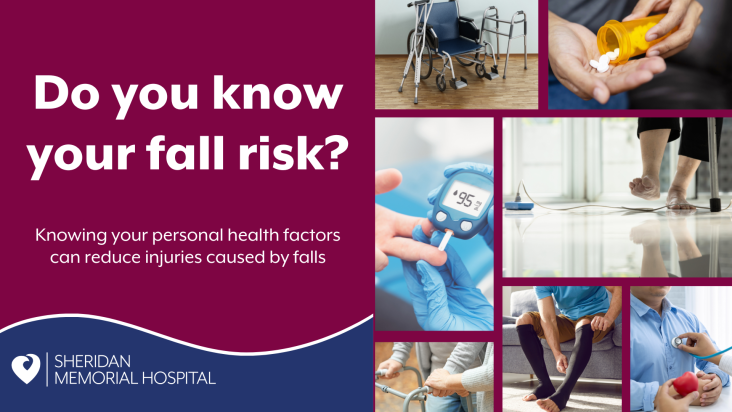By Dr. Abigail Turnbough, physician at Sheridan Memorial Hospital’s Rheumatology
How knowing your risks can decrease falls
No one particularly likes to fall down. As children, when we fall, often we shed some tears, seek comfort and return to play. But as we age, a fall can result in significant injury with long-lasting consequences to health and independence.
There are many ways to prevent falls; here are some ideas to consider:
Understand your medical conditions
According to the National Institute on Aging, conditions such as diabetes, heart disease or problems with your thyroid, nerves, feet or blood vessels can impact balance. Worsening eyesight also contributes to falls. Knowing your health history and risk factors can raise your awareness to factors that can impair your balance and strength. If strength and deconditioning is a significant issue, consider asking your doctor about physical therapy. Physical therapists may also be helpful for people with vertigo.
Know your medications
If you take any medications regularly, it’s important to understand the side effects and be prepared for them. Many medications can cause dizziness so preparing yourself with tools to provide stability can reduce the risk of falling. Taking medications, when possible, at times you don’t expect to be active can also help reduce fall risk.
Properly utilize walking aids
If walking, standing or other mobility has become difficult, equipment such as a cane or walker can help you maintain independence. Ensure these aids fit you properly. For example, a cane should be long enough to reach the crease of the wrist when your arm is straight and you are standing. The hand grips on a walker should be at hip height or level with your wrists when your arms are slightly bent, when you have shoes on and are standing. Using a four-wheeled walker may not be best if you have balance issues; instead, I recommend using a two-wheeled walker.
Consider compression, TED stockings
Anti-embolism or compression stockings apply pressure across the leg to promote increased blood flow and therefore decrease risks of dizziness caused by low blood pressure.
Know your limits
If you experience dizziness or weakness, know when to slow down, pause or even stop what you’re doing. Understanding that our bodies change with time can be one of the most useful ways to prevent falls. Know what you are capable of and when to ask for help with riskier activities.
Check your home
Outfitting your home with items like nightlights to improve visibility, wearing eyeglasses if you need them and installing handrails to aid balance can help reduce the risk of falls. Ditching home décor like area rugs, ensuring cords are tucked away and decluttering can also remove tripping hazards.
For adults 65 and older, falls remain the leading cause of injury and injury-related deaths, but taking appropriate precautions and understanding your personal risks can help you lower your chances of falling and extend your ability to live independently.

